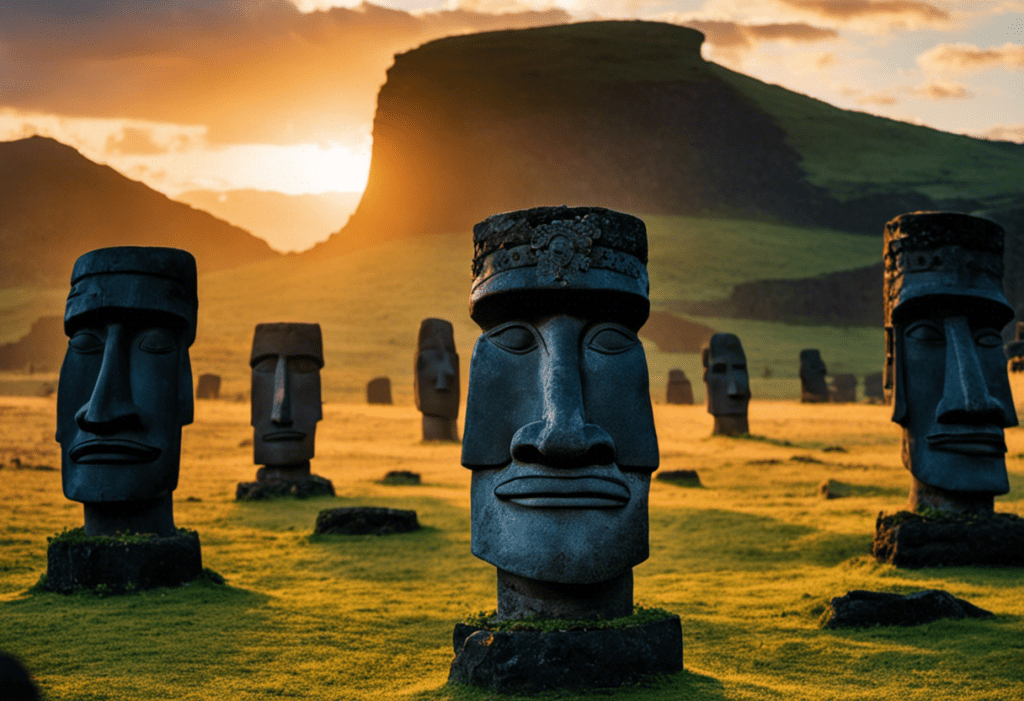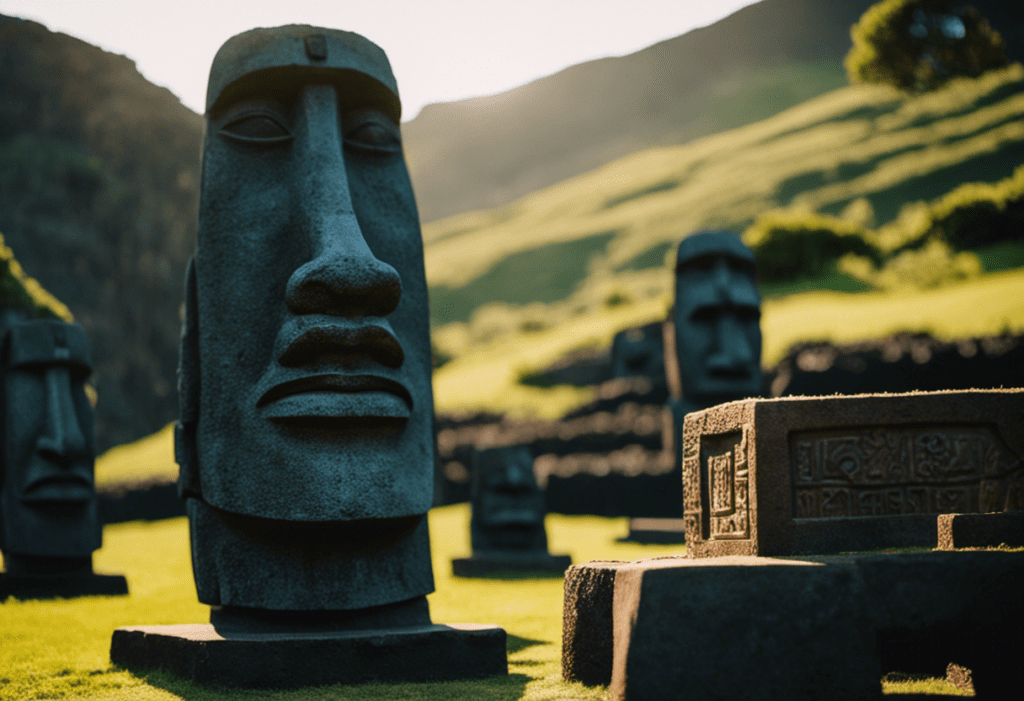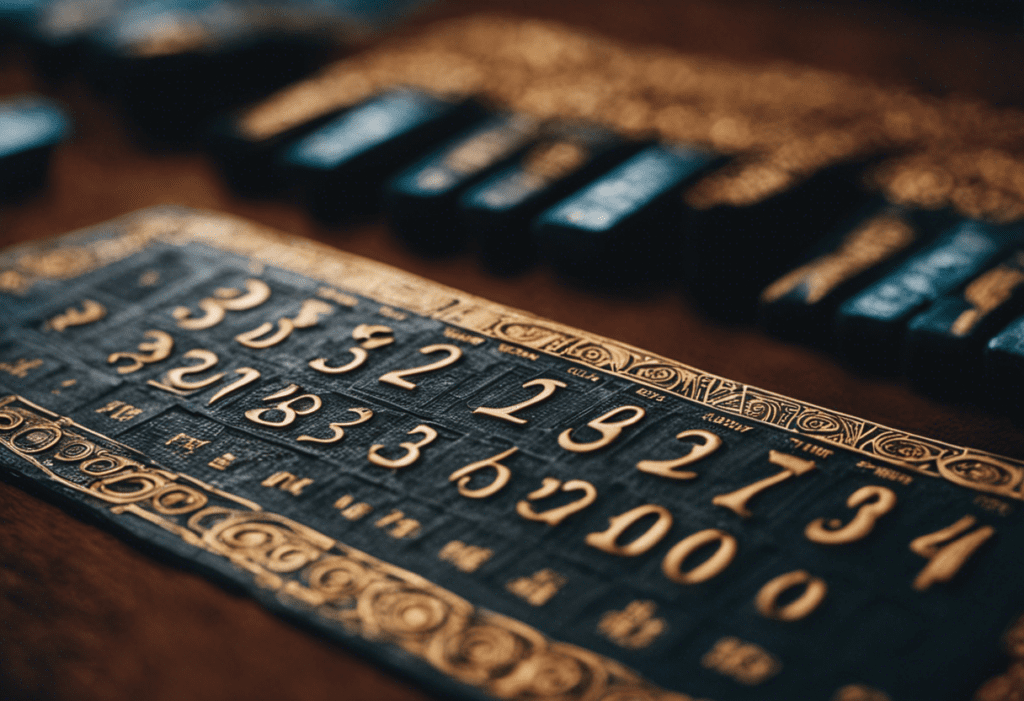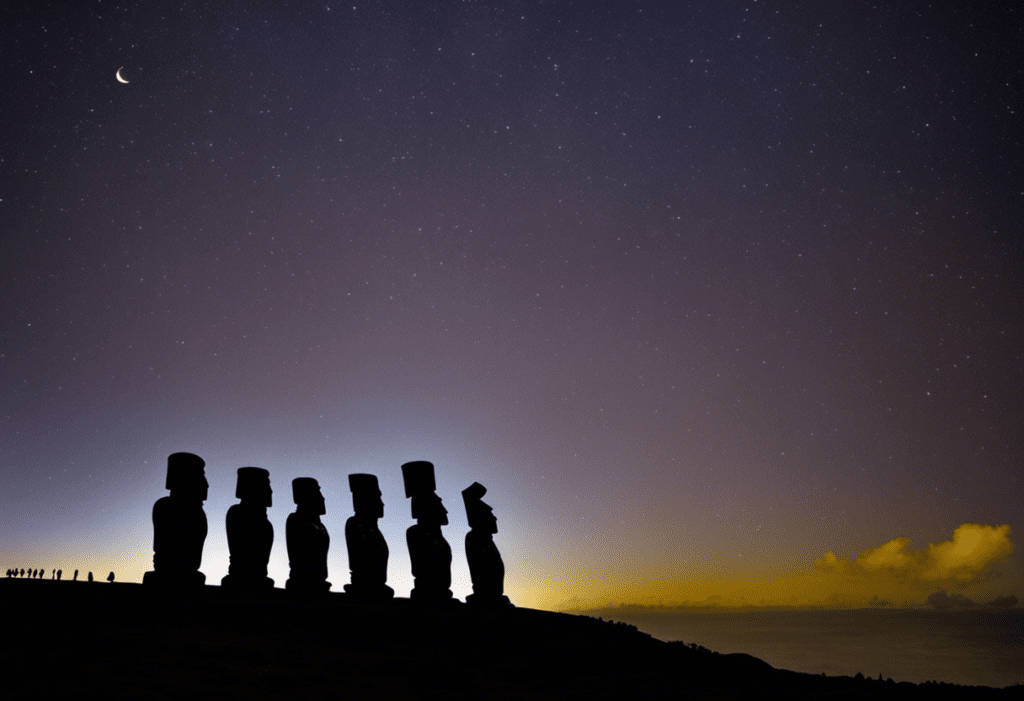In the mysterious world of Rapa Nui, a remote island in the Pacific Ocean, the passage of time is marked by a diverse range of significant events and rituals.
Exploring the intricacies of the Rapa Nui Calendar reveals a fascinating cultural heritage, rooted in ancient traditions and deep respect for ancestors.
From the vibrant Tapati Festival to the symbolic Birdman Ritual, each ceremonial occasion holds deep meaning and provides a fascinating glimpse into the spiritual essence of this captivating Polynesian civilization.
Key Takeaways
- The Rapa Nui calendar is filled with significant events and rituals that highlight the cultural traditions and customs of the community.
- Annual cultural celebrations like the Tapati Festival and the New Year’s Celebration showcase traditional arts, music, and sports, and bring families and friends together.
- The Birdman Ritual and Harvest Festivals are important events that involve intense training, physical challenges, and community feasts to honor bravery, leadership skills, and agricultural harvests.
- Equinox and Solstice ceremonies are held to honor the balance between light and darkness and to express gratitude for the abundance of the land, while Ancestor Worship Rituals and Ceremonies pay respect to ancestors, establish a connection with the spiritual realm, and reinforce cultural identity and intergenerational ties.
Tapati Festival
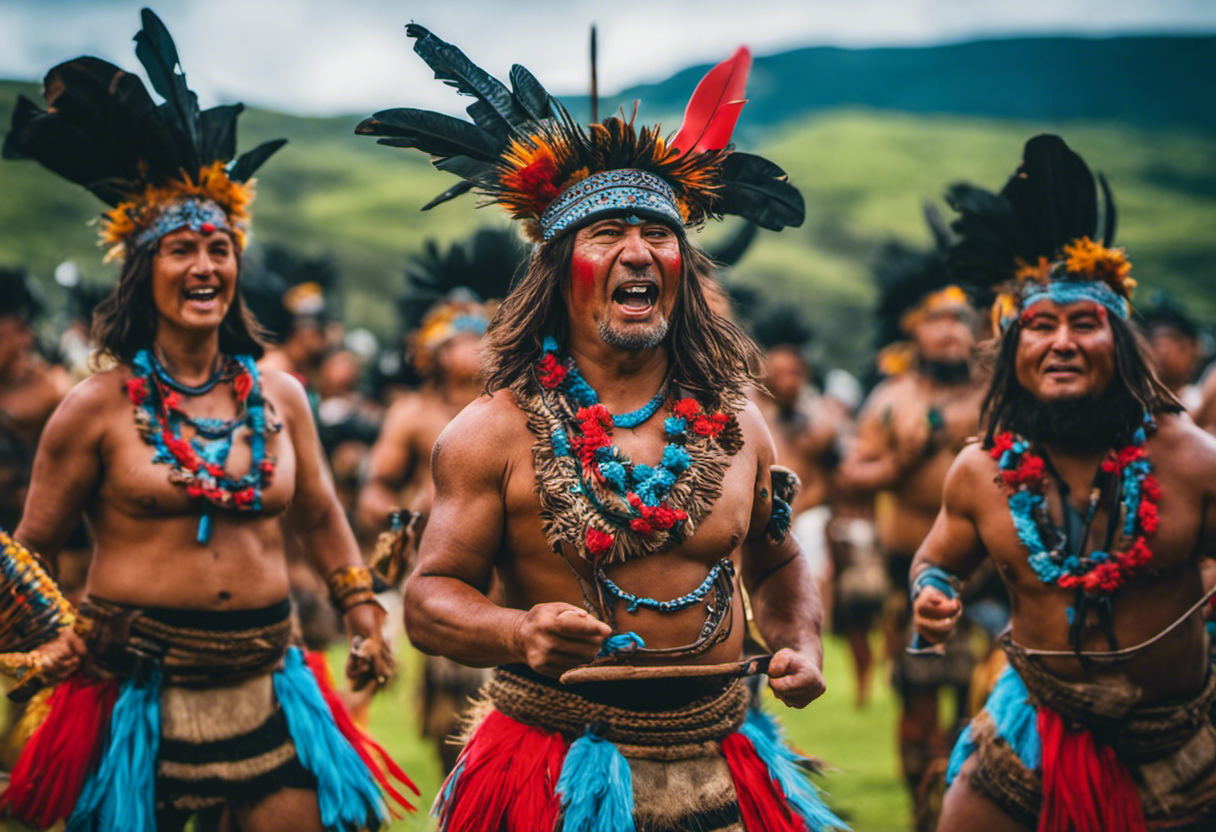

The Tapati Festival is a significant cultural celebration in Rapa Nui known for its vibrant display of traditional arts, music, and sports. This annual festival, which takes place in February, showcases the rich cultural heritage of the Rapa Nui people and provides a platform for cultural competitions and traditional games.
During the Tapati Festival, participants take part in various cultural competitions that highlight their skills and talents. These competitions include traditional dance performances, where participants showcase their agility and grace through rhythmic movements and intricate choreography. Additionally, there are singing competitions, where participants demonstrate their vocal abilities by singing traditional songs in the native language.
One of the most exciting aspects of the Tapati Festival is the traditional games. These games not only entertain but also serve as a means to preserve the cultural traditions of the Rapa Nui people. Examples of traditional games played during the festival include haka pei, a sled race down a steep hill, and riu, a swimming competition in the ocean.
The Tapati Festival is not only a celebration of Rapa Nui culture but also an opportunity to encourage younger generations to embrace their heritage and keep the traditions alive. Through cultural competitions and traditional games, the festival fosters a sense of pride and unity among the Rapa Nui community, ensuring the continued thriving of their cultural legacy.
Birdman Ritual
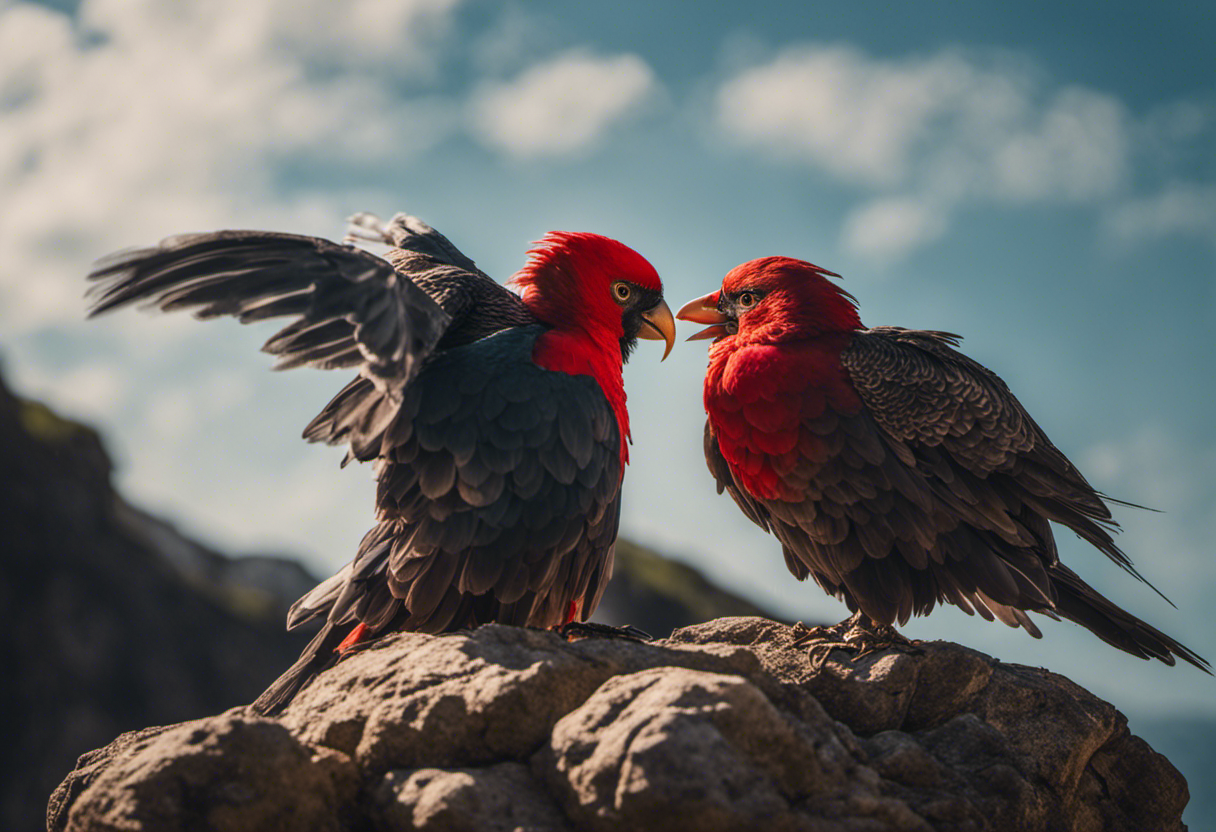

The Birdman Ritual is a highly significant event in the Rapa Nui calendar and holds great cultural and spiritual importance for the Rapa Nui people. It is eagerly anticipated every year.
The highlight of this ritual is the Birdman competition, where representatives from different clans compete to showcase their bravery and leadership skills.
The participants, known as tangata manu, undergo intense training to prepare for the event. They demonstrate their physical strength and endurance by scaling the treacherous cliffs of Orongo, a ceremonial village situated on the southwestern coast of Easter Island. From there, they swim through waters infested with sharks to reach the small islet of Motu Nui.
The objective of the tangata manu is to locate the first egg laid by a sooty tern bird and bring it back to Orongo. The individual who successfully retrieves the egg becomes the Birdman for the following year, bringing honor and prestige to their clan.
During the Birdman competition, the participants wear ceremonial costumes representing various bird species. These costumes are intricately designed, adorned with feathers, and reflect the unique characteristics of each bird. They play a vital role in the competition as they symbolize the connection between the participants and the spirits of the birds.
The Birdman Ritual is a sacred event that showcases the Rapa Nui’s deep reverence for nature and their ancestral traditions. It is a celebration of bravery, strength, and the spiritual harmony between humans and birds.
New Year’s Celebration
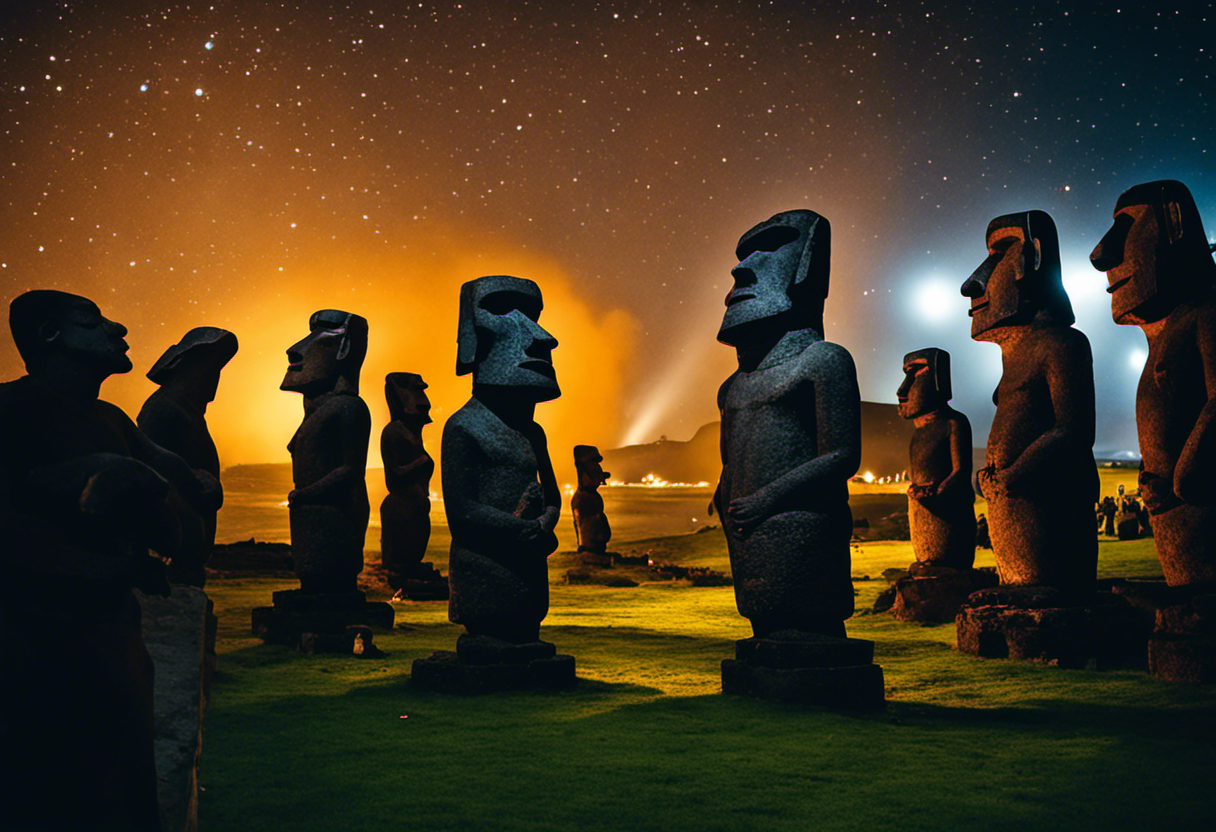

One of the significant events in the Rapa Nui calendar is the annual New Year’s celebration. This celebration marks the start of a new year and is a time for reflection, renewal, and setting intentions for the year ahead. Like many other cultures worldwide, the Rapa Nui people also participate in the tradition of making New Year’s resolutions. These resolutions are personal goals or aspirations that individuals set for themselves to achieve during the coming year. It is believed that by making these resolutions, individuals can improve themselves and bring positive change to their lives.
Countdown parties are a popular way to welcome the New Year on Rapa Nui. These parties often include music, dancing, and fireworks, creating a festive atmosphere. Families and friends come together to celebrate the passing of the old year and the arrival of the new one. The countdown to midnight is an exciting moment as everyone eagerly awaits the start of the New Year. Once the clock strikes midnight, people cheer, hug, and exchange well wishes for the year ahead.
Harvest Festivals
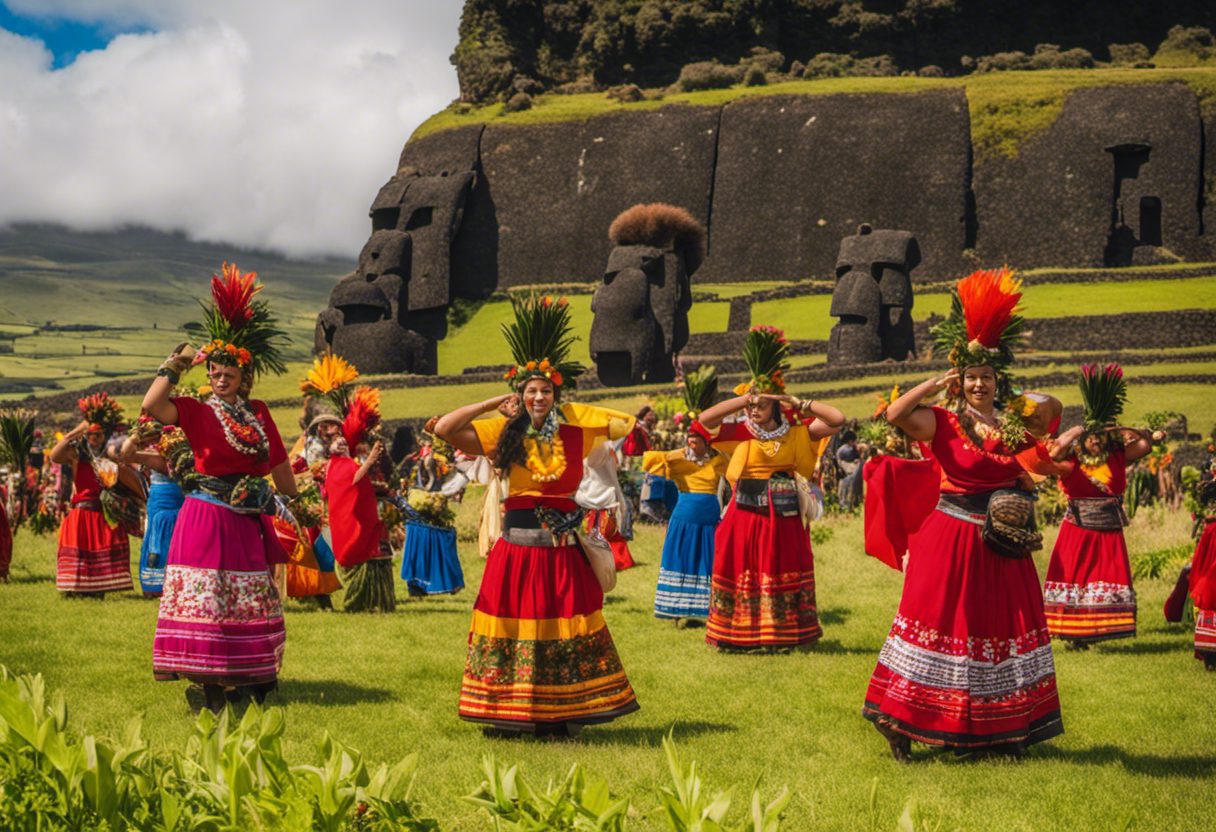

Harvest festivals are a significant annual event in the Rapa Nui calendar. These festivals bring the community together to celebrate the abundance of their agricultural harvests. A central part of these festivities is the community feasts, where everyone contributes food and gathers to share in the joy of the harvest.
The harvest festivals not only serve as a time of celebration but also provide an opportunity for agricultural blessings. The Rapa Nui people believe in the cyclical nature of life and the interconnectedness between humans and nature. Therefore, they perform rituals and ceremonies to express gratitude to the gods for the successful harvest and to ensure prosperity for the upcoming growing season.
During the harvest festivals, the Rapa Nui people showcase their traditional dances, music, and art, adding to the festive atmosphere. The community comes alive with vibrant colors and rhythmic beats, creating an atmosphere of joy and unity. It is a time for families and friends to come together, strengthen bonds, and pass down cultural traditions to younger generations.
These festivals also serve as a reminder of the importance of the land and its resources in sustaining the community. They provide an opportunity to reflect on the hard work and dedication that goes into farming and to appreciate the gifts of nature. Through these festivals, the Rapa Nui people honor their agricultural heritage and express their deep connection to the land.
Equinox and Solstice Ceremonies
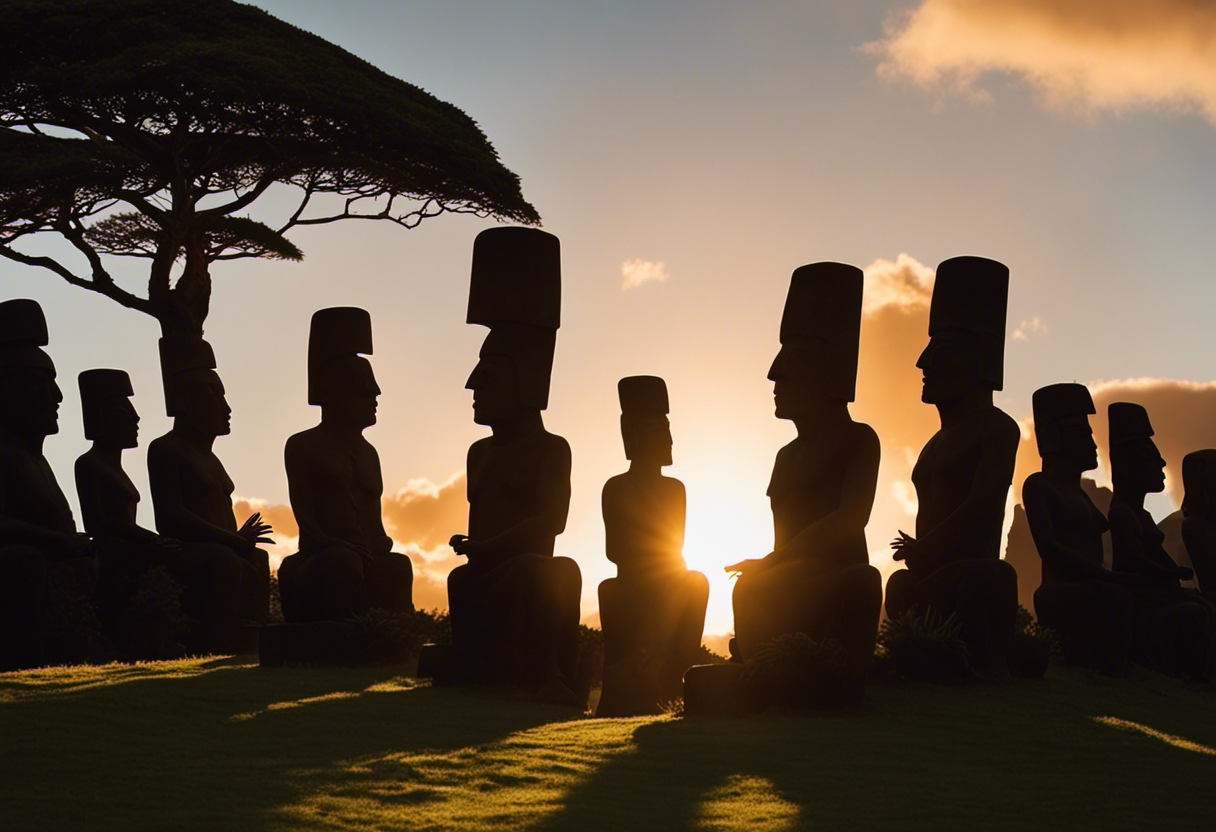

Equinox and solstice ceremonies have a significant role in the Rapa Nui calendar, marking important astronomical events and symbolizing the connection between the Rapa Nui people and the celestial world.
The equinox celebrations occur twice a year, during the spring and autumn equinoxes, when day and night have equal length. These celebrations are held to honor the balance between light and darkness and to welcome the changing seasons.
During the equinox ceremonies, the Rapa Nui people gather at sacred sites such as Ahu Akivi, where seven moai statues stand facing the sea. They participate in rituals, including dance and song, to pay homage to their ancestors and to seek blessings for the upcoming season.
The solstice rituals, on the other hand, take place during the summer and winter solstices, when the sun reaches its highest or lowest point in the sky. These ceremonies are held to acknowledge the changing of seasons and to express gratitude for the abundance of the land.
Both equinox and solstice ceremonies are deeply rooted in Rapa Nui culture and spirituality. They serve as a reminder of the strong connection between the Rapa Nui people and the natural world, as well as a way to honor and preserve their ancestral traditions.
Through these rituals, the Rapa Nui people express their gratitude for the cycles of nature and their place within it.
Ancestor Worship Rituals
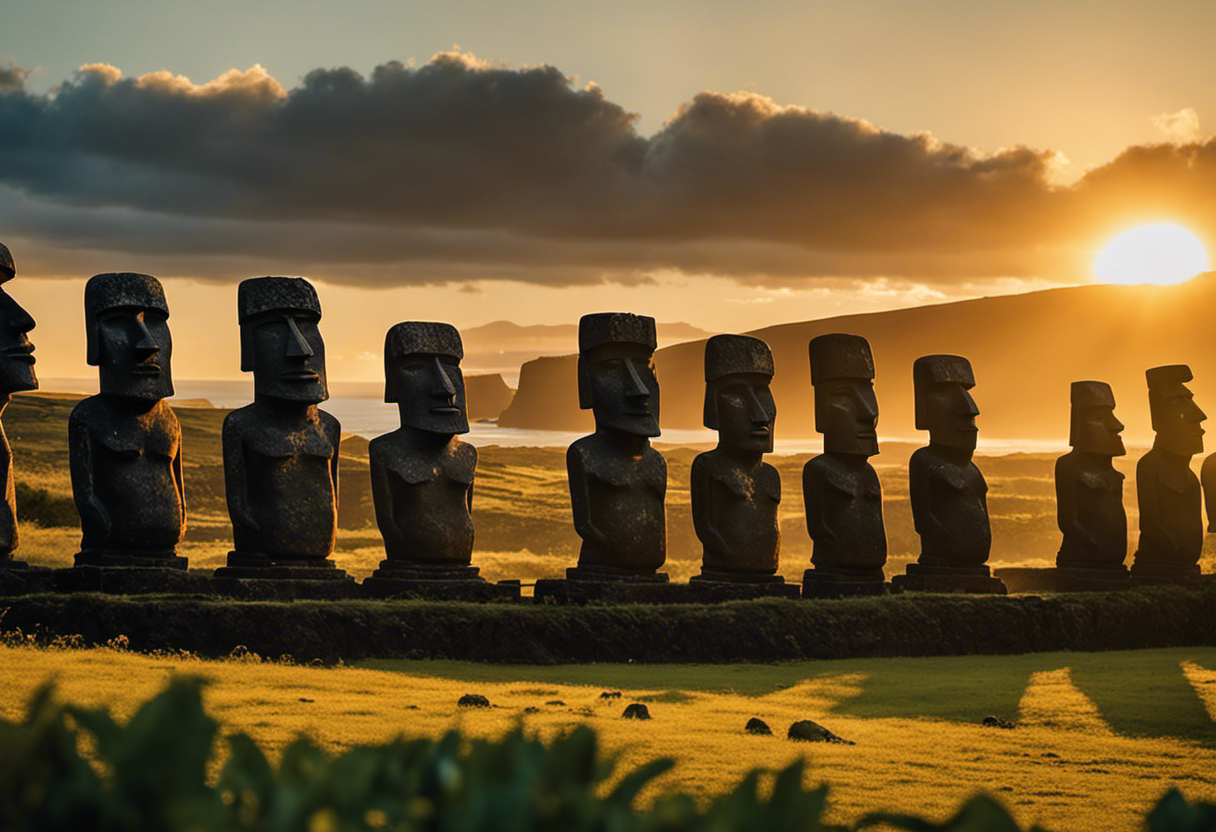

Ancestor worship rituals held a significant purpose and played a crucial role in the cultural traditions and practices of the Rapa Nui people.
These ceremonies were conducted to honor and pay respect to their ancestors, who were believed to possess spiritual powers and guidance.
The Rapa Nui sought to establish a connection with their ancestors and seek their blessings for the prosperity and well-being of their community through elaborate rituals and offerings.
These rituals were an integral part of their cultural fabric, serving as a way to stay connected with their roots and maintain a sense of identity and belonging.
Ritual Purpose and Significance
The worship rituals associated with the Rapa Nui calendar hold deep significance and are centered around honoring the ancestral spirits. These rituals involve symbolic practices and shamanic traditions that establish a connection between the living and their ancestors.
-
Connection with the spiritual realm: Through these rituals, the Rapa Nui people believe they can communicate with their ancestors and seek their guidance and protection.
-
Ancestor reverence: The rituals serve as a way to show respect and gratitude to their ancestors for their wisdom, protection, and blessings.
-
Continuity of lineage: The rituals reinforce the belief in the intergenerational bond, ensuring the continuation of family lineage and the preservation of ancestral customs.
Cultural Traditions and Practices
The cultural traditions and practices surrounding ancestor worship rituals in the Rapa Nui calendar have deep roots in the belief system and customs of the Rapa Nui people.
Ancestor worship holds great significance in Rapa Nui culture, and it is marked by a variety of traditional music and dance forms. These rituals serve as a way for the Rapa Nui people to pay homage to their ancestors and seek their guidance and protection.
Traditional music, including chanting and drumming, is often performed during these rituals to create a sacred ambiance and invoke the presence of the ancestors. Similarly, dance forms like the haka pei and hoko reflect the profound reverence and respect that the Rapa Nui people have for their ancestors.
These practices not only strengthen the community’s connection to their past, but also act as a means of passing down cultural knowledge and traditions to future generations.
Ancestor Worship Ceremonies
Ancestor Worship Ceremonies
Continuing from the previous discussion on cultural traditions and practices, the Rapa Nui calendar includes a significant element known as ancestor worship ceremonies. These ceremonies hold great importance for the Rapa Nui people and are deeply rooted in their belief system. Here are three key points to consider:
-
Commemorative rituals: Throughout the year, the Rapa Nui engage in various rituals to honor and remember their ancestors. These rituals often involve feasting, music, dance, and the offering of food and gifts.
-
Ancestral veneration: Ancestor worship is a central component of Rapa Nui culture. The Rapa Nui believe that their ancestors continue to be present in their lives and can provide guidance and protection. Through these ceremonies, they express their respect and gratitude to their forebears.
-
Spiritual connection: The ancestor worship ceremonies serve as a means for the Rapa Nui community to connect with their past and strengthen their cultural identity. These rituals foster a sense of unity and reinforce the intergenerational ties that bind the Rapa Nui people together.
The observance of ancestor worship ceremonies plays a vital role in preserving the traditions and values of the Rapa Nui, ensuring the continuity of their cultural heritage.

